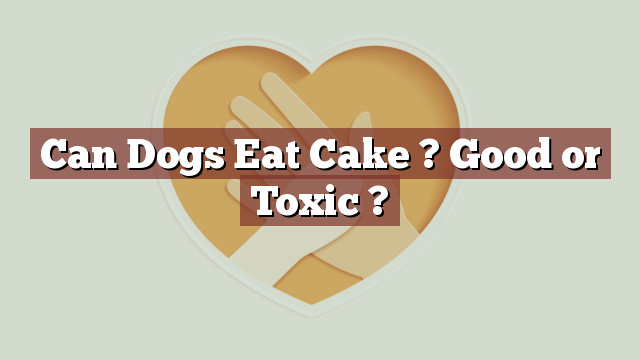Can Dogs Eat Cake? Good or Toxic?
When it comes to our furry friends, it’s essential to know what foods are safe for them to consume. As responsible pet owners, we want to ensure that our dogs are not only enjoying their treats but also staying healthy. One common question that arises is, can dogs eat cake? Let’s explore the nutritional value of cake for dogs and understand if it is safe for them to indulge in this sweet delight.
Nutritional Value of Cake for Dogs: Understanding the Ingredients
Cake, a beloved dessert for humans, typically contains ingredients like flour, sugar, eggs, butter, and various flavorings. While these ingredients may be tasty and enjoyable for us, they might not provide the same benefits for our canine companions. When it comes to the nutritional value of cake, it is important to note that it is generally high in calories and lacks the essential nutrients that dogs need for a balanced diet.
Can Dogs Eat Cake? The Safety of Feeding Cake to Your Canine Companion
In simple terms, the answer is no, dogs should not eat cake. While a small bite may not be immediately harmful, it is important to remember that dogs have different digestive systems than humans. Some of the ingredients commonly found in cakes, such as chocolate, raisins, or artificial sweeteners like xylitol, can be highly toxic to dogs. These substances can cause severe health issues, including vomiting, diarrhea, pancreatitis, seizures, and even death.
Veterinary professionals strongly advise against feeding cake to dogs, as it can lead to unnecessary health risks. It is crucial to prioritize their well-being and opt for safer alternatives.
Potential Risks and Benefits of Allowing Dogs to Eat Cake
Allowing your dog to eat cake can expose them to several risks. As mentioned earlier, certain ingredients can be toxic to dogs. Chocolate, for instance, contains theobromine, which dogs cannot metabolize efficiently, leading to chocolate poisoning. Additionally, the high sugar content in cakes can contribute to obesity, dental problems, and diabetes in dogs.
On the other hand, there are no significant benefits of allowing dogs to eat cake. Dogs require a balanced diet that includes protein, carbohydrates, fats, vitamins, and minerals. Cake simply does not provide the essential nutrients they need to thrive.
My Dog Ate Cake: Steps to Take and When to Seek Veterinary Help
If you suspect that your dog has consumed cake, it is important to take immediate action. First, assess the situation and determine whether your dog ingested any toxic ingredients like chocolate or xylitol. If so, contact your veterinarian right away for guidance. They may instruct you to induce vomiting or take other necessary measures depending on the situation.
Remember, every minute counts when dealing with potential poisoning or health risks. Don’t hesitate to seek professional help if needed.
Conclusion: Moderation and Safe Alternatives for Treating Your Dog
In conclusion, it is best to avoid feeding cake to your dog altogether. While it may be tempting to share your indulgence with your furry friend, the potential risks outweigh any benefits. Instead, opt for safe alternatives specifically made for dogs, such as dog-friendly bakery treats or homemade recipes tailored to their nutritional needs.
As responsible pet owners, our priority should always be the health and well-being of our dogs. By understanding the potential dangers of feeding cake to our canine companions and making informed decisions, we can ensure they lead long, happy, and healthy lives.
Thank you for investing your time in exploring [page_title] on Can-Eat.org. Our goal is to provide readers like you with thorough and reliable information about various dietary topics. Each article, including [page_title], stems from diligent research and a passion for understanding the nuances of our food choices. We believe that knowledge is a vital step towards making informed and healthy decisions. However, while "[page_title]" sheds light on its specific topic, it's crucial to remember that everyone's body reacts differently to foods and dietary changes. What might be beneficial for one person could have different effects on another. Before you consider integrating suggestions or insights from "[page_title]" into your diet, it's always wise to consult with a nutritionist or healthcare professional. Their specialized knowledge ensures that you're making choices best suited to your individual health needs. As you navigate [page_title], be mindful of potential allergies, intolerances, or unique dietary requirements you may have. No singular article can capture the vast diversity of human health, and individualized guidance is invaluable. The content provided in [page_title] serves as a general guide. It is not, by any means, a substitute for personalized medical or nutritional advice. Your health should always be the top priority, and professional guidance is the best path forward. In your journey towards a balanced and nutritious lifestyle, we hope that [page_title] serves as a helpful stepping stone. Remember, informed decisions lead to healthier outcomes. Thank you for trusting Can-Eat.org. Continue exploring, learning, and prioritizing your health. Cheers to a well-informed and healthier future!

